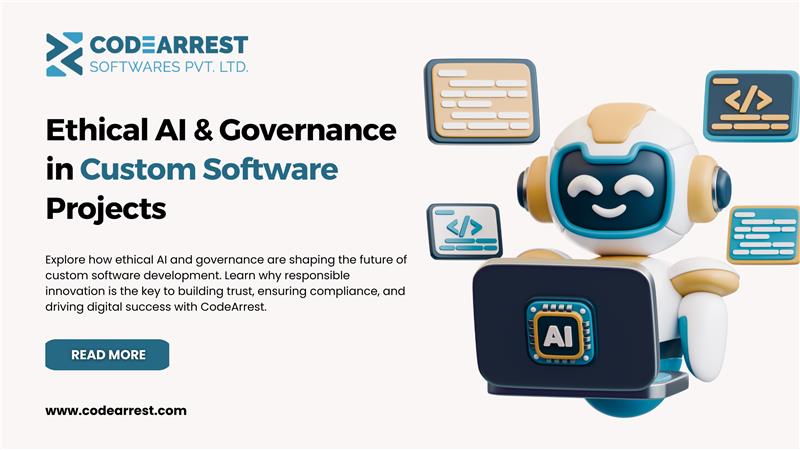Blogs

Ethical AI & Governance in Custom Software Projects
In today’s digital world, custom software is no longer just about meeting business needs—it’s about shaping the way people interact with technology. With the rise of Artificial Intelligence (AI), companies are integrating machine learning and automation into custom solutions to improve efficiency, personalization, and decision-making.
But there’s a growing challenge: How do we ensure these AI-driven solutions are ethical, transparent, and responsible?
This is where ethical AI and governance in custom software projects come in. Businesses must now not only deliver innovative products but also ensure their technology protects user rights, avoids bias, and remains compliant with global regulations.
Understanding Ethical AI in Custom Software
Ethical AI refers to the practice of building AI-driven systems that are:
- Fair and Unbiased – avoiding discrimination in data and decision-making.
- Transparent – making sure users understand how AI makes decisions.
- Accountable – ensuring businesses take responsibility for AI outcomes.
- Privacy-Focused – protecting user data and ensuring security.
When applied to custom software, ethical AI means designing applications that prioritize both business goals and societal values. For example, an AI-powered CRM should not only optimize sales but also respect customer data privacy.
Why Governance is Critical in AI-Driven Custom Software
Governance is the framework of policies, processes, and standards that guide how AI is developed and used in custom software projects.
Key aspects include:
- Compliance with Regulations – GDPR, HIPAA, or industry-specific data laws.
- Clear Accountability – defining who is responsible for AI decisions.
- Risk Management – identifying and mitigating unintended consequences.
- Auditability – having systems in place to track and explain AI decisions.
Without governance, businesses risk reputational damage, legal penalties, and customer distrust.
The Hidden Risks of Ignoring Ethical AI in Custom Software
- Bias in Algorithms
AI learns from data. If your data is biased, your custom software could unintentionally discriminate against certain users. - Data Privacy Violations
Mishandling sensitive data can lead to lawsuits, penalties, and brand damage. - Loss of Customer Trust
In today’s digital-first world, customers choose brands they can trust. Unethical AI erodes that trust. - Regulatory Penalties
Governments are increasingly strict about AI usage. Ignoring governance can mean heavy fines.
How Businesses Can Implement Ethical AI in Custom Software
Here are practical steps businesses should take when working with AI-driven custom solutions:
1. Build Fair & Inclusive Systems
Use diverse datasets to train AI models, ensuring outcomes are unbiased and representative.
2. Prioritize Transparency
Offer users insights into how AI makes decisions. For instance, if a custom software solution denies a loan application, the user should know why.
3. Protect Data Privacy
Incorporate privacy-by-design principles, encryption, and strict access controls.
4. Establish Governance Frameworks
Define roles, responsibilities, and accountability for AI outcomes.
5. Regular Auditing & Testing
Continuously test AI models for fairness, accuracy, and compliance with evolving regulations.
Real-World Examples
- Healthcare Custom Software – AI that diagnoses patients must ensure fairness across gender, race, and age groups.
- Financial Applications – AI in loan approval software must be transparent and unbiased.
- Retail & E-commerce – Personalized recommendations should not misuse private data or manipulate buyers unfairly.
The Role of Businesses in Driving Ethical AI
Companies adopting custom software must take proactive steps in shaping ethical technology. It’s not enough to rely on vendors or developers—business leaders must actively prioritize:
- Training teams in AI ethics
- Embedding compliance checks in development workflows
- Creating user-centric policies
By doing so, businesses not only protect themselves legally but also enhance customer loyalty and brand credibility.
Future of Ethical AI in Custom Software
Looking ahead, AI governance will only become stricter. Countries like the UK, US, and members of the EU are already implementing AI-specific laws. Businesses that integrate ethics into their custom software development today will enjoy a competitive edge tomorrow.
Moreover, consumers increasingly prefer brands that take a stand on responsible innovation. Building trustworthy software isn’t just a compliance issue—it’s a growth strategy.
Conclusion
In the race to innovate, businesses often forget one crucial element—ethics. As AI becomes the backbone of custom software development, companies must prioritize transparency, fairness, privacy, and governance.
At CodeArrest, we believe innovation and responsibility go hand-in-hand. By embedding ethical AI and governance into every custom software project, businesses can not only accelerate growth but also earn lasting trust in the digital era.
Contact us: +1 302-400-2818, +91 70738 99493
Info: sales@codearrest.com
